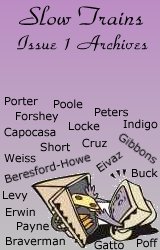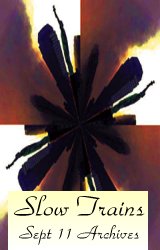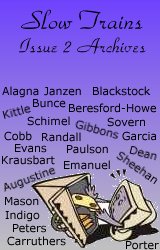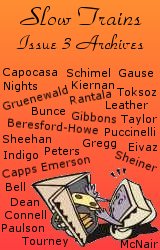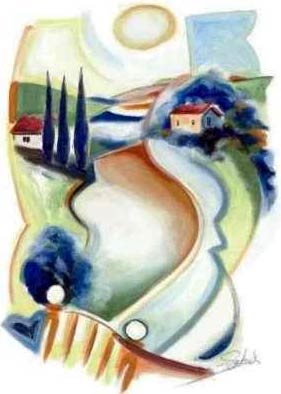
The Dictionary of Youthful Lies
by William Dean
Time is not a line dribbled from a pen, but an endless circle;
gathering up past and present
tense and rolling them together, like Sisyphus, into tomorrow.. Pick
up a childhood’s
broken toy today and be conjoined into yesteryear’s youthful lies...
“What do you call this?” asks the father, his voice in that flat medium
range between a
shout and a bite.
The son has his answer ready. He has practiced it, memorized it as if
from a book he will
one day write to astound the world.
I call this living. I call this natural living. I call this the
positive way of things, the way I
have discovered when I shivered in fright that you and all the yous
standing behind and
before and around you would vanish, would leave me, would abandon me.
Me, a child of
five years with no strength, no wisdom. Me, a child with nothing but
heart and longing
and fear. I discovered my own way because you wouldn’t show me
another. I call this
the way I must survive. This is the son’s answer, yet he stands
silently looking at the
floor.
“I asked you a question,” the father says with a shake of his fist.
I am a prisoner, the son thinks. I am Cervantes and Casanova and De
Sade, locked
away because I think of things and the things grow into stories and the
stories are not
about me but are only about me. I am jailed up in gray blankets that
smell of old blacks
and old whites that have faded. I look out through the bars of this
cell, this small cell in
which I pace to and fro and back again as I walk the whole world over
and measure its
grayness with my eyes. I look out through this tiny window though I
cannot even crawl
and must fly, like a miniature sparrow whose wings hurt him like
wounds.
I am forced to answer you, because you are the warden, the jailer, the
interrogator, the
liberator if you choose, but you do not choose. So I am meek, shy, a
little coquettish,
teasing myself with freedoms you don’t want me to have, don’t expect me
to suspect.
“Nothing,” says the son.
The father starts to grab his son’s shoulder and shake him, but stops
just short of the
reach. Perhaps it is too far. Perhaps the touch would be too much.
“Clean it up. Now,”
says the father.
But these are the pebbles that will assemble into my grave marker,
the son tells himself.
These messy, strewn sheets of scribbles are my testimonies, my poems,
my desperate
revelations of the prisoner I have been made into. Here, look, a
quatrain perfect in its
rhythms, startling in its confessions. Have you no eyes in your heart
to see what is
written? Is the jailer so terrifyingly locked away that flights and
crimes and
self-permissions have lost their meaning? Here, look. I have
assembled from the floating
gray motes in this small cell the soar of an eagle, the roar of lion,
the bleat of victim and
the raucous skirl of enemies pared down into a mere four lines.
There beneath your footstep, half-hidden by your massive shoe, is a
sonnet that would
make Shakespeare sing with a modern voice and Erasmus wink back his
tears and shout
his faith renewed. Over there, by the door, when you walked in you
trod across the pages
of an escape whose maelstrom terrors and proud reluctance could be
glory read aloud to a
million hungry spirits.
The father bends stiffly and grabs up a piece of paper. His face grows
redder, eyes
smaller. “You used my paper!” he shouts. “You stole this from my
desk, didn’t you?”
He rears back a slap but does not fire it to the target. In place of
that violence, he turns
this way and that, a snatching dancer who wads each sheet of paper into
a crackling fist in
his fists. The floor is sheared, the fleece of its loose pages cut off
to the bare and flat
linoleum plain of before. The world of its words made trash.
The father leaves the cell cleansed, the prisoner standing alone, still
looking at the floor
between his small feet. You can’t stop me, he tells himself, meaning
the father.
As if he heard, the father stops, his hard eyes over the ridge of his
shoulder. As if he
heard, his lips slip back from his clenched teeth. As if he were deaf,
he turns again and
leaves, closes the door, the cell door, the prison gate, the escape
route to the world.
To the closed door, the son murmurs, “Nothing.” He stretches out his
short arms and
spins. “Nothing. Nothing, nothing, nothing.” Yet in his small mind,
he sits himself down
at a desk and writes in carefully printed letters: e-v-e-r-y-t-h-i-n-g.
“What were you thinking just now?” the lover asks, as if you could
answer in a sentence
the whole of your life up to that moment and beyond.
“Nothing.”

